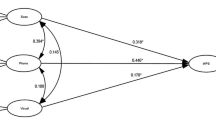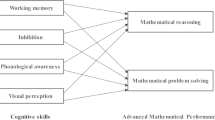The effects of working memory (WM) capacity on mathematical ability are well known. This relationship is seen mainly for the capacity of visuospatial WM, while the capacity of the phonological loop of WM, which is associated with processing sound and speech information, has been suggested to have a minor effect on mathematical ability in adults. Nonetheless, involvement of the language neural networks in mathematical thought remains controversial. We have studied the effects of the capacity of the phonological loop of WM on the rate and correctness of solution of mathematical and verbal tasks in young, healthy, right-handed volunteers who either had higher education or were students at institutions teaching mathematics and humanities. Subjects in the mathematics group (N = 10) solved all tasks with measures of solution correctness (CA) and response time (RT) which were significantly better than values for subjects of the humanities group (N = 10). The capacity of the phonological loop of WM showed no difference between the two groups but had different effects on CA and RT values for tasks in mathematicians and humanities specialists. Spearman correlation analysis for each group separately showed that the capacity of WM had positive effects on CA for all mathematical tasks only in the mathematicians group, where it had no effect on RT, while the reverse tendency was seen in the humanities group. The capacity of WM in the mathematicians group correlated inversely with RT for logical tasks on arithmetic sequences. Our results provide indirect evidence that WM in the verbal domain can influence mathematical ability, especially when tasks require the involvement of logical thought.
Similar content being viewed by others
References
Amalric, M. and Dehaene, S., “Origins of the brain networks for advanced mathematics in expert mathematicians,” Proc. Natl. Acad. Sci. USA, 113, No. 18, 4909–4917 (2016).
Baddeley, A., “Working memory: looking back and looking forward,” Nat. Rev. Neurosci., 4, No. 10, 829–839 (2003).
Beddeli, A. D., “Does working memory work?” in: Cognitive Psychology: History and Current State. A Reader, Lomonosov, Moscow (2011), pp. 312–322.
Bull, R., “Short-term memory, working memory, and executive functioning in preschoolers: longitudinal predictors of mathematical achievement at age 7 years,” Dev. Neuropsychol., 33, No. 3, 205–228 (2008).
Chomsky, N., Language and Mind, Cambridge Univ. Press, Cambridge (2006).
Crain, S., Shankweiler, D., Macaruss, P., and Bar-Shalom, E., “Working memory and sentence comprehension: Investigation of children and reading disorders,” in: Impairments of Short-Term Memory, G. Vallar and T. Shallice (eds.), Cambridge Univ. Press, Cambridge (1990), pp. 539–555.
Dehaene, S., Spelke, E., Pinel, P., et al., “Sources of mathematical thinking: behavioral and brain – imaging evidence,” Science, 284, No. 5416, 970–974 (1999).
Fedorenko, E. and Varley, R., “Language and thought are not the same thing: evidence from neuroimaging and neurological patients,” Ann. N. Y. Acad. Sci., 1369, No. 1, 132–153 (2016).
Furst, A. and Hitch, G. J., “Separate roles for executive and phonological components in mental arithmetic,” Mem. Cognit., 28, 774–782 (2000).
Gathercole, S. E. and Pickering, S. J., “Working memory deficits in children with low achievements in the national curriculum at 7 years of age,” Br. J. Ed., 70, 177–194 (2000).
Geary, D. C., Brown, S. C., and Smaranayake, V. A., “Cognitive addition: A short longitudinal study of strategy choice and speed-f-processing difference in normal and mathematically disabled children,” Dev. Psychol., 27, 787–797 (1991).
Hitch, G. J., “The role of short-term working memory in mental arithmetic,” Cogn. Psychol., 10, 302–323 (1978).
Ricks, T. R., Turley-Ames, K. J., and Wiley, J., “Effects of working memory capacity on mental set due to domain knowledge,” Mem. Cognit., 35, 1456–1462 (2007).
Rottschy, C., Langner, R., Dogan, I., et al., “Modelling neural correlates of working memory: a coordinate-based meta-analysis,” NeuroImage, 60, No. 1, 830–846 (2012).
Shankweiler, D. and Crain, S., “Language mechanisms and reading disorder: A modular approach,” Cognition, 24, 139–168 (1986).
Stone, J. M. and Towse, J. N., “A working memory test battery: Java-based collection of seven working memory tasks,” J. Open Res. Softw., 3, No. 1 (2015).
Swanson, H. L. and Sachse-Lee, C., “Mathematical problem solving and working memory in children with learning disabilities: Both executive and phonological processes are important,” J. Exp. Child Psychol., 79, 294–321 (2001).
Vladimirov, I. Yu. and Korovkin, S. Yu., “Working memory as a system supporting mental processes,” in: Cognitive Psychology: Phenomena and Challenges, V. F, Spiridonov (ed.), Lenand, Moscow (2014), pp. 8–21.
Wiley, J. and Jarosz, A. F., “How working memory capacity affects problem solving,” Learn. Motivat., 56, 185–227 (2012).
Xiang, Y., Jiang, Y., Chao, X., et al., “Brain-mechanistic responses to varying difficulty levels of approximate solutions to arithmetic problems,” Sci. Rep., 6, 24194 (2016).
Author information
Authors and Affiliations
Corresponding author
Additional information
Translated from Zhurnal Vysshei Nervnoi Deyatel’nosti imeni I. P. Pavlova, Vol. 68, No. 3, pp. 340–348, May–June, 2018.
Rights and permissions
About this article
Cite this article
Chemerisova, E.V., Martynova, O.V. Effects of the Phonological Loop of Working Memory on the Productivity of Solving Mathematical and Verbal Tasks in Specialists in Mathematics and the Humanities. Neurosci Behav Physi 49, 857–862 (2019). https://doi.org/10.1007/s11055-019-00812-1
Received:
Accepted:
Published:
Issue Date:
DOI: https://doi.org/10.1007/s11055-019-00812-1




